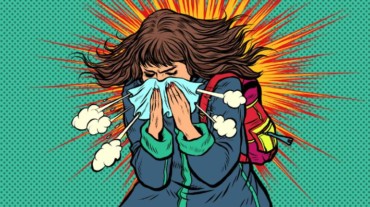
Ever since this year began, we have been living with a pandemic—one that is caused by a novel coronavirus the world hasn’t seen before. These are the hard facts of our life in 2020—one in which, we are wary of anyone with even a slight cough. After all, that is what the limited information we have about covid-19 indicates.
Coughing, sore throat, and breathlessness are some of the most common symptoms of covid-19 or at least that’s what health agencies like WHO have been telling us. But as the medical fraternity delves deep into the pathology of SARS-CoV-2, new information has been coming to the fore. Part of this is new symptoms, ones we are not currently associating with covid-19.
According to the CDC, a runny nose can also be a sign of covid-19
Recently, the American Centers for Disease Control and Prevention (CDC) updated its covid-19 resource page to include three new symptoms caused by the novel coronavirus infection.

According to the CDC, congestion or runny nose, nausea, and diarrhoea can also be symptoms of covid-19. These additions take the number of known symptoms of the infection to 11.
Following are all the symptoms of covid-19, according to the American health agency:
• Fever or chills
• Cough
• Shortness of breath or difficulty breathing
• Fatigue
• Muscle or body aches
• Headache
• New loss of taste or smell
• Sore throat
• Congestion or runny nose
• Nausea or vomiting
• Diarrhoea
Why are these additions to the list of symptoms so important?
When the pandemic had begun, the medical advice was clear: the SARS-CoV-2 virus impacts the throat and hence the first few symptoms included sore throat and cough. In the event of limited testing, this symptom helped differentiate covid-19 cases from normal flu.
But now that congestion and/or runny nose are also part of the list, testing for covid-19 has become even more important—mostly because discerning the difference between any other viral infection and covid-19 has become all the more difficult.
Sensory symptoms of covid-19 must be paid heed to
Earlier this year, a slew of scientific studies—as well as the CDC—suggested that a loss of smell and taste are surefire symptoms of covid-19.
Now these symptoms, although rare, are markedly different from symptoms of the common cold—which can make getting medical attention easier and faster.
Select Topics of your interest and let us customize your feed.
PERSONALISE NOW
In fact, research also suggests that these are the early symptoms of covid-19, with the president of the British Rhinological Society stating in an interview to the BBC that: “We’ve been able to show that in groups of patients that have lost their sense of smell without any other symptoms, there’s a greater than 95% chance it is due to Covid-19 at the moment”.
Interesting enough, a research paper published in early April in medRXiv, a pre-print repository for clinical research manuscripts, states that the loss of appetite and diarrhoea were also seen in people who were covid-19 positive.
“Our study suggests that loss of taste and smell is a strong predictor of having been infected by the COVID-19 virus. Also, the combination of symptoms that could be used to identify and isolate individuals includes anosmia, fever, persistent cough, diarrhoea, fatigue, abdominal pain and loss of appetite,” the researchers from the King’s College London, Nottingham City Hospital, and Zoe Global Limited say.
Knowing the symptoms can help you get better medical treatment
Fever, cough, and cold are perhaps the most common ailments that plague us all-year-round. And just because we are in the middle of a pandemic, doesn’t mean that every sneeze or cough you take is an indicator that you’re covid-19 positive.
Understanding the covid-19 symptoms and how the virus affects the body can not only help you stay calm but also seek medical treatment at the right time—especially now when the Health Ministry’s advisory suggests that people with a moderate infection should recuperate at home.
So if your fever persists for days at an end without abating and is accompanied by loss of smell and taste, cough and cold, and abdominal issues—consult your doctor. In case you or someone you know starts feeling breathless and/or has trouble breathing, seek medical attention immediately.